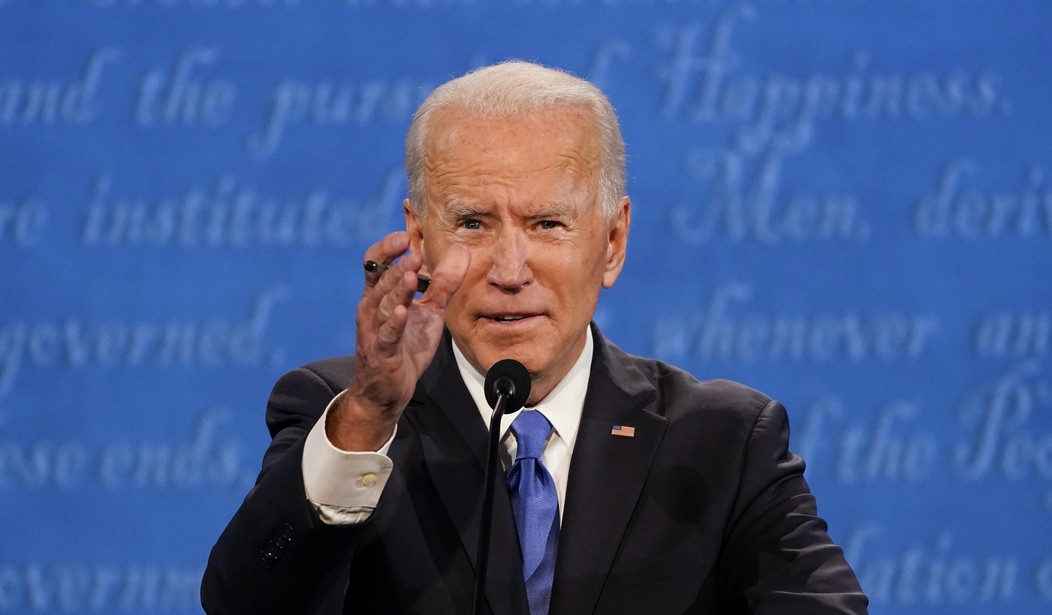After Joe Biden vowed to “transition” from oil, corporate America was put on high alert. This is the same Joe Biden who previously voiced support for having fossil fuels “eliminated.”
But the Biden agenda is not just a threat to the energy industry, or even Big Business in general. Bidenomics means higher taxes and more regulations for businesses large and small. In fact, small business would bear a disproportionately heavy burden under a Biden administration.
One example is a $15 federal minimum wage, which Biden supported again in the debate. Grappling with the COVID-19 pandemic, small business owners are under immense pressure to not only retain jobs without cutting hours, but also stay in business. When revenue goes down, labor costs become more and more costly. Raising the minimum wage to $15 an hour would only increase labor costs during a period of economic uncertainty, forcing job creators to make difficult choices—from slashing hours to laying off employees and closing altogether.
In President Trump’s words: “How are you helping your small businesses when you’re forcing wages? What's going to happen and what’s been proven to happen is when you do that these small businesses fire many of their employees.”
He’s right: According to the nonpartisan Congressional Budget Office, a $15 federal minimum wage would cost 1.3 million jobs. In cities like Seattle, where a $15 hourly minimum wage has been phased in, employee hours were cut and low-skilled workers were priced out of the labor market.
This also undermines workers early in their careers. About half of those Americans earning the federal minimum wage or less are under 25 years old. Many are high schoolers and college students who need entry-level jobs to advance in their professional careers. What they don't need is for those jobs to be eliminated, making upward mobility all the more difficult.
Recommended
And Seattle, Washington, is an urban hub. In rural states, small business owners are often operating in depressed markets and with even tighter profit margins, so a $15 federal minimum wage becomes even more intolerable. As President Trump explained, Seattle or New York City is better-equipped to deal with a $15 federal minimum wage than Alabama or Nebraska, where labor is cheaper.
Then there are taxes. Biden promises to leave tax rates untouched for Americans earning under $400,000 per year, but this arbitrary threshold is not the difference between wealth and poverty. The owners of bars, cafes, restaurants, hair salons, and independent bookstores (among others) would find themselves above the income cut-off, seeing lower take-home revenue as a result. Why are we punishing them?
Bidenomics would not only raise the corporate tax rate from 21 percent to an uncompetitive 28 percent, but planned increases in personal income and payroll tax rates would also affect so-called “pass-through” entities. Many of them are small businesses—employing more than 40 million workers—that pay taxes at individual rates.
The Biden plan could push the effective small-business tax rate to more than 50 percent at the federal level, on top of state income taxes. When it’s all said and done, small business owners could be paying two-thirds of their revenue in federal and state taxes under a Biden administration. How do you think that affects small business employees?
When you raise small business taxes, you leave some of America’s most important job creators with fewer resources to hire new employees and retain their current ones. Indeed, Bidenomics would result in about 5 million fewer working Americans and $6,500 less in median household income by 2030. U.S. economic output, meanwhile, would drop by $2.6 trillion.
This has nothing to do with “corporate interests” or the “one percent.” I’m a small business owner, not an oil tycoon, and Bidenomics would hurt job creators like me. We need elected officials to support us with lower taxes and fewer regulations, not a laundry list of government mandates.
The Biden agenda does nothing to support business—large or small. And it would do nothing for the U.S. economy, other than ruin it.
The owner and manager of Joseph’s Premier Real Estate, Joseph Semprevivo serves as an adjunct professor of finance, business, real estate and insurance at Indian River State College. He is also the author of the best-selling book “Madness, Miracles, Millions" and the former state economic development commissioner of New Mexico.
























Join the conversation as a VIP Member